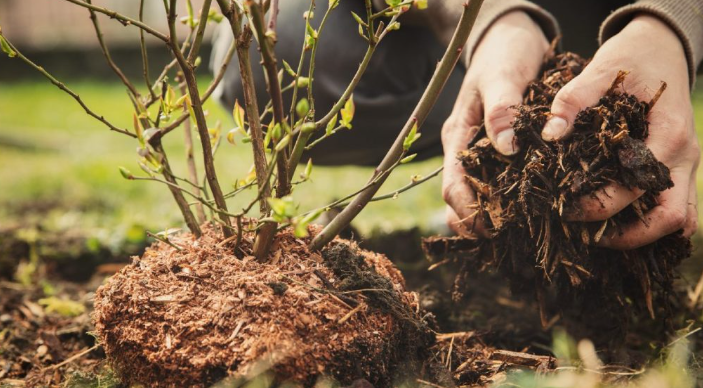Whether you’re a seasoned green thumb or a novice to the nurturing world of gardening, mulching is a term that should resonate with vibrant growth and healthy plant life.
It is a tried-and-true method that not only enhances the aesthetic appeal of your garden but offers a bounty of benefits for the well-being of your plants. In this post, we’ll unveil the hidden advantages of mulching and how it can boost the joy of your gardening endeavors.
The Multifaceted Benefits of Mulching for Your Garden
Protection Against the Elements
Mulching serves as a shield for soil and plants against extreme weather conditions.
During the scorching summer months, a layer of mulch helps to keep the soil cool and Retains humidity facilitating better water conservation.
Come winter, mulch acts as an insulating blanket that protects plant roots from frost heave and temperature shocks.
Weed Reduction and Control
A thick layer of mulch can effectively suppress weeds from taking over your garden.
By limiting the sunlight exposure to the soil surface, mulch prevents weed germination, which means less weeding work for you and more nutrients, water, and sunlight for your cherished plants.
Maintains Soil Nutrients
Mulch inhibits soil erosion caused by wind and water – two culprits that can deplete the topsoil of its valuable nutrients. By keeping the soil in place, your plants can enjoy a steady diet of the nutrients they need to flourish.
Additionally, as organic mulches decompose, they contribute organic matter back into the soil, thereby enriching it.
Increases Aesthetic Appeal
Apart from the numerous functional benefits, mulch brings a polished look to your garden beds. Available in various materials and colors, mulching can complement your landscape design, adding beauty and texture to create a cohesive and finished appearance.
Supports Beneficial Organisms
Mulches made from organic materials like shredded bark, straw, or compost encourage the activity of beneficial soil organisms. These creatures, such as earthworms, play a critical role in aerating the soil and breaking down the mulch into nutrients that plants can absorb.
Eco-friendly and Sustainable
Using mulch can be an environmentally friendly practice, especially when using local, renewable materials. It reduces water usage, minimizes the need for chemical weed controls, and recycles garden waste, aligning your gardening practices with sustainability goals.
The Connection with Xeriscaping
For those keen on establishing low-water landscapes, such as xeriscaping in Farmington, mulching is an invaluable ally. Xeriscaping is all about creating landscaping that conserves water while maintaining natural beauty. Mulching is an integral component of this practice, helping to reduce water evaporation from the soil, thus demanding less frequent irrigation.
Through the utilization of mulching within your xeriscaping design, you’re committing to an eco-conscious approach that champions plant health, water conservation, and resource efficiency.
Selecting the Right Mulch for Your Garden
Now that you’re aware of the benefits of mulching, choosing the right type for your garden takes some consideration.
Organic mulches, like bark, wood chips, straw, or compost, are generally preferred as they improve the soil’s structure, fertility, and aeration over time as they decompose. Inorganic mulches, like gravel or rubber, don’t enhance soil quality but may be ideal for permanent paths or areas where longevity is key.
Conclusion
Mulch might not always be at the forefront of garden chatter, but as we’ve discovered, its benefits are too substantial to overlook.
From safeguarding tender roots to bolstering your garden’s resilience to water conservation, mulching is a small action that yields a significant impact.
Whether you’re immersed in the realm of xeriscaping or cultivating a traditional garden paradise, remember – a layer of mulch could be the missing link to achieving that harmonious balance between beauty and functionality in your garden landscape.






